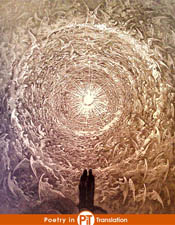The Divine Comedy
, translated by Kline, A. S. (contact-email)
Born in 1265 in Florence, from which he was banished in 1302, dying in Ravenna in 1321, Dante Alighieri set the Divine Comedy in the year 1300, when he was thirty-five years old and 'in the middle of our mortal life'. The setting allows him to utilise the past symbolically, exploit the present politically, and anticipate the future in simulated prophecy.
The Commedia throughout reflects his love for 'Beatrice' whom he first saw at a young age in a church in Florence, and who came to represent for him Intellectual and Spiritual Beauty. The story of his love for her, of her early death, and his inspiration to write the Commedia are told in his prose work La vita nuova, The New Life, of 1294.
The Divine Comedy is Dante’s record of his visionary journey through the triple realms of Hell, Purgatory and Paradise. This, the first 'epic' of which its author is the protagonist and his individual imaginings the content, weaves together the threads of Classical and Christian history; contemporary Medieval politics and religion; and Dante’s own inner life. The Commedia is essential reading not merely for Christians, poets, and historians, but for anyone struggling with issues of morality, the ethical framework of society, and the challenge of living the true life.

Kline, A. S.
Support Open-Access:
Your contribution keeps our classical translations available to all. Every dollar helps support classics education and funds the expansion of our catalogue. Value what we do? Donate now.
File Downloads:
© Copyright, All Rights Reserved. This work may be freely reproduced, stored and transmitted, electronically or otherwise, for any non-commercial purpose. Conditions and Exceptions apply.